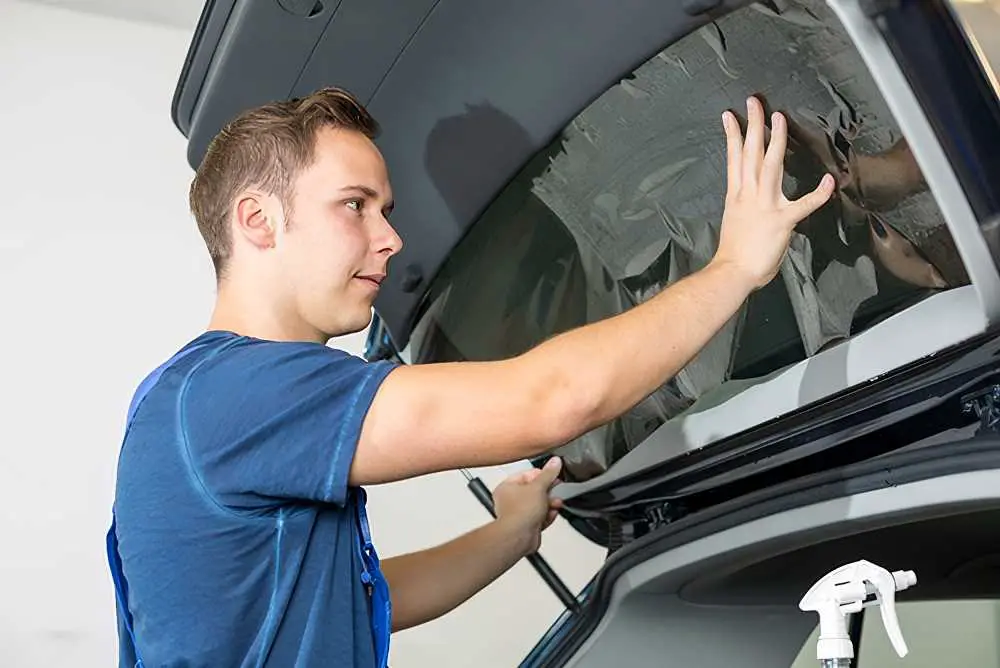Last Updated on February 23, 2024 by Vadym

Tinted windows are a popular choice for many vehicle owners. They offer a number of benefits, such as increased privacy, reduced glare, and improved aesthetics. However, one question that often comes up is whether rain can damage newly tinted windows.
The short answer is no, rain will not ruin your newly tinted windows. Modern window tinting techniques and materials are designed to withstand various weather conditions, including rain. In fact, the adhesive used to apply the tint film is typically water-resistant, meaning that it will not be affected by rainwater.
It is important to note that while rain will not damage your tinted windows, you should still avoid rolling down your windows immediately after they have been tinted. This is because the adhesive needs time to fully cure and bond to the glass. Depending on the specific tint and curing process used, you may be advised to wait anywhere from a few days to a couple of weeks before rolling down your windows.
Additionally, it is recommended to avoid using harsh cleaning products on your tinted windows, as they can potentially damage the tint film. Instead, use a mild soap and water solution, along with a soft microfiber cloth, to clean your windows. This will help preserve the integrity of the tint and ensure that it lasts longer.
Possible Effects of Rain on Tinted Windows
While rain in itself does not typically harm newly tinted windows, there are a few potential effects you should be aware of:
Watermarks: When rainwater evaporates, it can leave behind watermarks on your tinted windows. This is especially true if the water contains minerals or pollutants. To prevent watermarks, it’s important to properly clean and dry your windows after every rainfall.
Reduced Visibility: Rain can create a haze or fog on your tinted windows, which may affect your visibility while driving. It’s crucial to use your windshield wipers and defogging mechanisms to maintain a clear view of the road.
Scratches: If your windows are not properly cleaned before it rains, any dirt or debris on the surface can be rubbed against the tint film, potentially causing scratches. Regularly washing your windows and using a soft, non-abrasive cloth can help prevent this issue.
Peeling or Bubbling: While rain alone is unlikely to cause peeling or bubbling of tint film, if your windows were not properly installed or if the tint was applied incorrectly, moisture from rain can seep underneath the film and lead to these issues. It’s important to have your tint professionally installed to prevent any problems.
Maintenance: The best way to protect your tinted windows from the effects of rain is by properly maintaining them. Regularly cleaning your windows using gentle cleaners and a soft cloth, avoiding abrasive materials, and ensuring that the edges of the tint film are secure can help preserve the integrity of your tinted windows.
Remember, while rain itself may not ruin your newly tinted windows, it’s essential to take proper care and maintenance to ensure their longevity and performance.
Importance of Proper Tint Installation

Proper tint installation is crucial for the longevity and effectiveness of your newly tinted windows. While the benefits of window tinting, such as privacy, heat reduction, and UV ray protection, are well-known, it is important to recognize that the quality of the tint installation plays a critical role in ensuring these advantages.
When window tinting is installed properly, it forms a seamless bond with the glass, creating a protective barrier that is resistant to peeling, bubbling, and discoloration. On the other hand, poorly installed tint can lead to a number of problems, including adhesive failure, reduced visibility, and interference with the functionality of your windows.
One of the key aspects of proper tint installation is the selection of a high-quality film. Investing in a premium grade tint will not only enhance the overall appearance of your vehicle or property but will also provide long-lasting performance. Inferior films often contain lower quality adhesives and pigments, which can result in premature deterioration and disappointing results.
In addition to using superior tint products, proper installation techniques are equally important. The process requires attention to detail, precision, and specialized knowledge. Professional installers have the expertise and experience to ensure a flawless application, utilizing industry-standard tools and techniques.
Furthermore, professional tint installation comes with a warranty that covers any potential defects or issues. This provides peace of mind and protects your investment. In contrast, DIY tint installation is often not covered by any warranty, leaving you responsible for any replacement or repair costs.
To sum up, the importance of proper tint installation cannot be overstated. By choosing a reputable professional to install your window tint, you are ensuring the best possible outcome. From improving the appearance and comfort of your vehicle or property to enhancing its overall value, proper tint installation is essential.
How to Protect Tinted Windows from Rain
While rain can potentially damage newly tinted windows, there are steps you can take to protect them and ensure their longevity. By following these tips, you can avoid any potential damage caused by rain.
1. Allow the tint to fully cure: It is important to let the tinted windows cure for the recommended time before exposing them to rain. This can typically take around 2-4 days, but it is best to consult the manufacturer’s instructions for the specific tinting product used.
2. Close the windows: When rain is in the forecast, it is advisable to keep the windows closed to minimize water exposure. This will help prevent any water from seeping into the edges of the tint and potentially causing damage.
3. Avoid touching the tinted surface: Even after the tint has fully cured, it is still important to avoid touching the surface with wet hands or objects. This can disturb the tint and potentially cause it to peel or bubble.
4. Use a rain repellent product: Applying a rain repellent product to your tinted windows can help repel water and reduce the chances of water damage. There are specific products available that are safe to use on tinted windows, so be sure to choose one that is compatible with your window tint.
5. Regular maintenance: It is important to regularly clean and maintain your tinted windows to keep them in good condition. Use a gentle, non-abrasive cleaner and a microfiber cloth to clean the windows. Avoid using harsh chemicals or abrasive materials, as these can damage the tint.
6. Seek professional help: If you notice any signs of damage or peeling on your tinted windows after rain exposure, it is best to seek professional help. They can assess the extent of the damage and provide the necessary repairs or reapplication of the tint.
| Pros | Cons |
|---|---|
| Protection from UV rays | Potential for damage if not properly cared for |
| Improved privacy | Possibility of peeling or bubbling |
| Reduced glare | May need to be replaced over time |
| Enhanced aesthetics | Potential for increased cost |
By following these steps and taking proper care of your tinted windows, you can ensure their longevity and protect them from any potential damage caused by rain.
Benefits of Tinted Windows
Tinted windows offer numerous benefits for both your vehicle and your personal comfort. Here are some of the advantages of having tinted windows:
|
Protection from Harmful UV Rays Tinted windows block a significant amount of UV radiation, protecting you and your passengers from the harmful effects of the sun. This can help prevent skin damage and reduce the risk of skin cancer. |
|
Reduced Interior Heat Tinted windows can significantly reduce the amount of heat that enters your vehicle, especially during hot summer months. This can improve your overall comfort and reduce the need for excessive air conditioning, resulting in potential energy savings. |
|
Glare Reduction Tinted windows can help reduce glare from the sun, bright headlights, and other sources of intense light. By minimizing glare, tinted windows can improve visibility and make driving safer, particularly during times of low sun and at night. |
|
Enhanced Privacy and Security Tinted windows provide an added level of privacy and security by making it more difficult for others to see inside your vehicle. This can be especially beneficial when you have valuable items stored inside, as it reduces the risk of theft. |
|
Protection for Upholstery Tinted windows can help prevent fading and deterioration of your vehicle’s upholstery caused by prolonged exposure to the sun. This can help preserve the interior of your vehicle and maintain its aesthetic appeal over time. |
|
Improved Energy Efficiency Tinted windows can help improve the energy efficiency of your vehicle by reducing the amount of heat that enters and exits through the windows. This can make your car’s cooling and heating systems work more efficiently, resulting in potential fuel savings. |
In addition to these benefits, tinted windows can also enhance the appearance of your vehicle and add value to it. However, it’s important to check your local laws and regulations regarding window tinting to ensure compliance and avoid potential legal issues.
Common Misconceptions about Tinted Windows
There are several common misconceptions about tinted windows that often lead to misinformation and confusion. Understanding these misconceptions can help individuals make informed decisions about their window tinting needs. Here are some of the most prevalent misconceptions:
- Tinted windows are illegal: Many people believe that tinting their windows is illegal. However, this is not true in most cases. While there may be specific laws regarding the darkness of window tinting, most states allow a certain level of tinting as long as it meets the legal requirements.
- Tinted windows reduce visibility: One common misconception is that tinted windows significantly reduce visibility. While it is true that dark tints can impact visibility, professional window tinting services can provide various options that maintain a clear view while still providing the desired level of privacy and sun protection.
- Tinted windows are only for aesthetics: Another misconception is that tinted windows are purely for cosmetic purposes. While window tinting does enhance the appearance of a vehicle or building, it also provides functional benefits such as reducing glare, blocking harmful UV rays, and improving energy efficiency.
- Tinted windows will easily peel or bubble: Some people believe that tinted windows are prone to peeling and bubbling, especially when exposed to heat or moisture. However, high-quality window tinting films are designed to be durable and long-lasting, resisting peeling, bubbling, and discoloration.
- Tinted windows are expensive: Many individuals think that window tinting is costly, but this is not always the case. The cost of window tinting depends on various factors such as the type of film, the size of the windows, and the professional installation cost. In many cases, the long-term benefits and savings from window tinting outweigh the initial investment.
- Tinted windows interfere with electronic devices: It is a common misconception that tinted windows can interfere with electronic devices such as GPS, cell phones, or radio signals. However, high-quality window tinting films are designed to have minimal impact on electronic signals, ensuring that devices continue to function properly.
By debunking these common misconceptions, individuals can better understand the benefits of tinted windows and make informed choices that meet their needs and preferences. It is always recommended to consult with a professional window tinting service to ensure proper installation and compliance with local laws and regulations.
